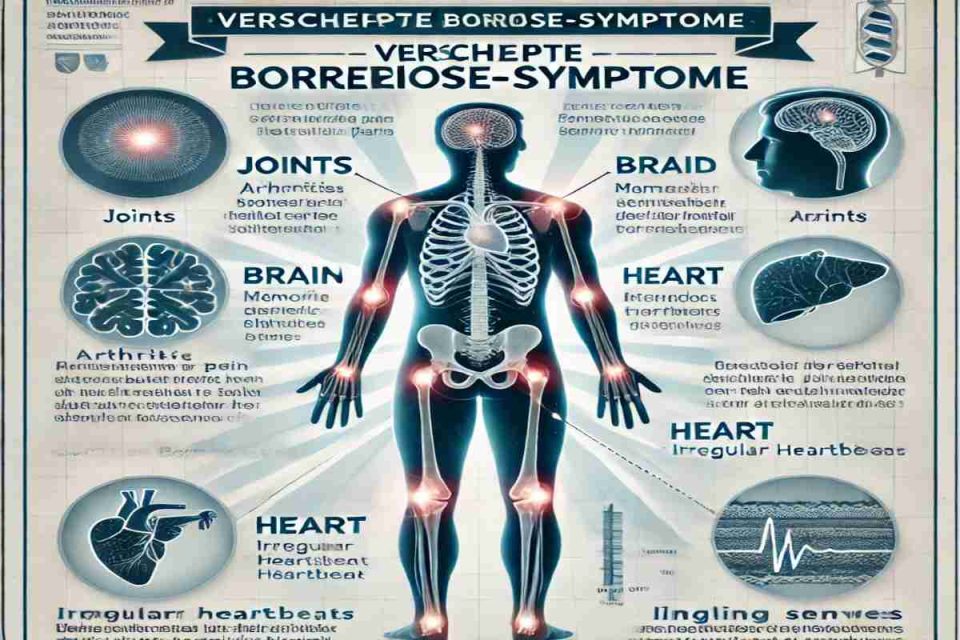Lyme disease, known as Borreliose in German, is a bacterial infection caused by Borrelia bacteria transmitted through tick bites. When left untreated or misdiagnosed, it can develop into verschleppte Borreliose (chronic or late-stage Lyme disease), leading to long-term health complications. If you are searching for verschleppte Borreliose-Symptome, this article will explain its causes, symptoms, and treatment options.
Table of Contents
What is Verschleppte Borreliose?
Verschleppte Borreliose refers to persistent Lyme disease that has not been properly diagnosed or treated in the early stages. As a result, the bacteria spread throughout the body, affecting joints, the nervous system, and even the heart.
Common Verschleppte Borreliose-Symptome
Late-stage Lyme disease can manifest in various symptoms, including:
1. Neurological Symptoms
- Memory loss and difficulty concentrating (often called “Lyme brain”)
- Numbness, tingling, or shooting pains in limbs
- Facial paralysis (Bell’s palsy)
- Insomnia and chronic fatigue
2. Joint and Muscle Pain
- Persistent arthritis-like symptoms, particularly in knees
- Muscle stiffness and spasms
- Swelling and redness in joints
3. Cardiovascular Issues
- Irregular heartbeat (Lyme carditis)
- Shortness of breath
- Dizziness and fainting episodes
4. Psychological Effects
- Depression and anxiety
- Mood swings and irritability
- Panic attacks
Causes and Risk Factors
- Delayed or Inadequate Treatment – If Lyme disease is not treated with antibiotics in its early stage, it can progress to a chronic condition.
- Immune System Weakness – A compromised immune system can allow Borrelia bacteria to persist longer.
- Misdiagnosis – Symptoms of late-stage Lyme disease are often mistaken for fibromyalgia, multiple sclerosis, or chronic fatigue syndrome.
Diagnosis of Verschleppte Borreliose
Diagnosing chronic Lyme disease can be challenging, but doctors use:
- ELISA and Western Blot Tests – Blood tests to detect Borrelia antibodies.
- Spinal Tap (Lumbar Puncture) – In cases of neurological symptoms.
- MRI or CT Scans – To check for brain and nerve involvement.
Treatment Options
1. Antibiotic Therapy
- Oral antibiotics like doxycycline or amoxicillin for mild cases.
- Intravenous antibiotics for severe or long-term infections.
2. Pain Management
- Anti-inflammatory drugs (NSAIDs) for joint pain.
- Physiotherapy to improve mobility and muscle strength.
3. Lifestyle and Alternative Treatments
- Herbal Supplements – Some natural remedies like Japanese knotweed and cat’s claw are believed to support immune function.
- Dietary Changes – Anti-inflammatory diets can help reduce symptoms.
- Physical Therapy and Yoga – Beneficial for muscle and joint stiffness.
Prevention Tips
- Avoid tick-infested areas, especially in forests and grassy fields.
- Wear long-sleeved clothing and use insect repellents.
- Check for ticks after outdoor activities and remove them promptly.
Conclusion
If you suspect verschleppte Borreliose-Symptome, early diagnosis and treatment are crucial to preventing severe complications. Always consult a medical professional if you experience persistent neurological, joint, or cardiac symptoms. Proper treatment and lifestyle adjustments can help manage the condition effectively.
Related Pages:

